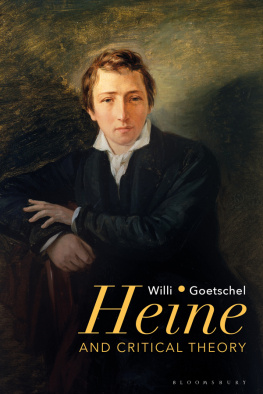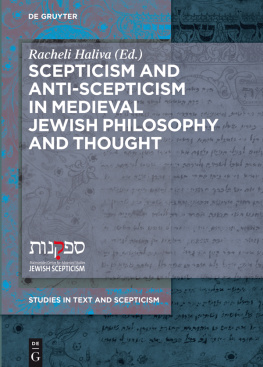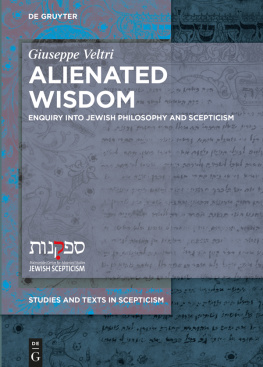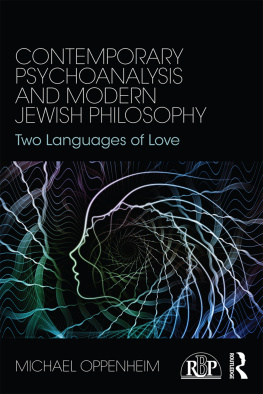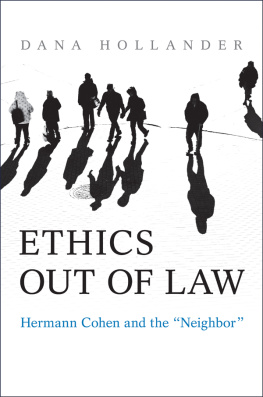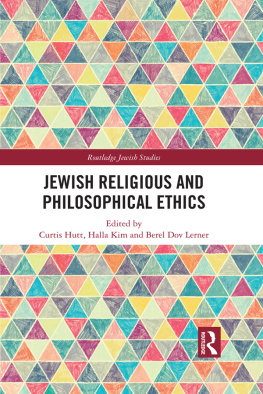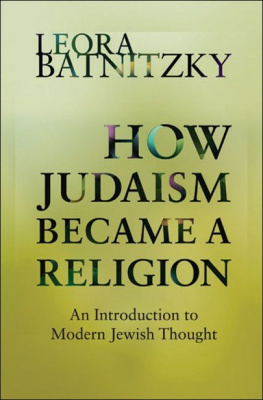The Discipline of Philosophy and the Invention of Modern Jewish Thought
The Discipline of Philosophy and the Invention of Modern Jewish Thought
Willi Goetschel

Copyright 2013 Fordham University Press
All rights reserved. No part of this publication may be reproduced, stored in a retrieval system, or transmitted in any form or by any meanselectronic, mechanical, photocopy, recording, or any otherexcept for brief quotations in printed reviews, without the prior permission of the publisher.
Fordham University Press has no responsibility for the persistence or accuracy of URLs for external or third-party Internet websites referred to in this publication and does not guarantee that any content on such websites is, or will remain, accurate or appropriate.
Fordham University Press also publishes its books in a variety of electronic formats. Some content that appears in print may not be available in electronic books.
Library of Congress Cataloging-in-Publication Data
Goetschel, Willi, 1958
The discipline of philosophy and the invention of modern Jewish thought / Willi Goetschel.
p. cm.
Includes bibliographical references and index.
ISBN 978-0-8232-4496-6 (cloth : alk. paper)
1. Jewish philosophyHistory. I. Title.
B755.G57 2013
181.06dc23
2012027759
Printed in the United States of America
15 14 13 5 4 3 2 1
First edition
CONTENTS
ACKNOWLEDGMENTS
Jewish philosophy? If the question might sound Greek to you, this is no coincidence. But it certainly raises a host of questions, such as: In what language, what dialect, does philosophy speak? Can philosophy be translated from one dialect into another without lossor, possibly, and more interestingly, with what kind of gain? Or is philosophy altogether a reinvention anytime it is translated, whether from one dialect to another or evenand no less consequentialwithin the same dialect? Can we even speak of philosophy as a self-identical project over time, or does it, rather, take shape in the form of ever-changing practices commonly referred to under the same rubric? Can the legend about the Greek birth of philosophy be sustained, and at what cost? Can there be a local birthplace of the universal? Can there be many, and can we keep them apart?
These are only some of the questions that reside at the center of the re-emergence of the discussion concerning Jewish philosophy. But as the contexts change, so do the stakes and implications. The discourse on Jewish philosophy can assume very different roles according to the settings in which it takes place. From declarations of assertion to acts of complete denial, the scene can change dramatically. Oddly enough and regardless of whether attitudes are positively or negatively inclined, the discourse follows the same dictate of submission to the rule of exclusion. And curiously, challenges of this exclusionary thrust find reiterations even in some of the best-intended instances of the critical interventions. For as long as the strategic use of identity remains under the sign of the threat of falling back into a questionable form of essentialism, the exclusionary thrust of this discourse seems perniciously to persist.
This book took shape as an exploration of what the projects of Jewish philosophers might have in common and the idea that their family resemblances might help us understand each of these philosophers projects more precisely. The claim that there is a Jewish philosophyor once had been but in modernity has become a thing of the pasthas overshadowed a critical understanding and tends to obscure the very question of the legitimacy of the claim itself. Demonstrating a consistent and continuing resistance to any sort of classification under any category such as Jewish philosophy, philosophers from Spinoza and Mendelssohn to the present challenge rather than encourage the desire for any such quick and easy categorization. Instead, they stubbornly refuse easy assimilation to received notions of philosophy as they challenge the vision of academic philosophy as too narrow. Rather, their thought responds to an approach that sees them as articulating alternative ways to comprehend philosophy as an open, and open-ended, project.
Viewed this way, Jewish philosophers show a family resemblance that calls for a more accentuated understanding of how their projects relate to one another and to philosophy as their common project. As a result, their interventions become more clearly legible as we attend to the particular historical and systematic contexts in which they engage, an engagement whose pointedly philosophic impulse the discourse of the discipline of philosophy often seems to fail to register. The changing and always historically specific contexts demand critical attention not just for historical interest but because it is in and through the specificity of these contexts that these Jewish philosophers develop alternatives for rethinking the project of philosophy anew.
This book, just like any idea, is the result of many conversations and exchanges. To some degree it would be futile even to begin to try to list all the people and all the many instances and occasions that led to what has now turned into a book. This book would never have been conceived were it not for the profound impact that the work, thought, and friendship of Hermann Levin Goldschmidt have meant and continue to mean for me. It was in the attempt to contextualize the critical thrust of Goldschmidts thought that I first began to understand that contextualizing his work meant comprehending the particular relationship between Jewish philosophy and philosophy as an academic discipline, a relationship that, ultimately, defines the challenge of the project of philosophy itself. Having completed the book, I now more fully appreciate the range to which this impact applies.
If a book is a repository of discussions, this one owes much to many years of inspiring conversations with David Suchoff, Susan Shapiro, Nils Roemer, and Bob Gibbs. Aamir Mufti and Robbie Shilliam were both crucial in helping me to better understand the deeper significance that postcolonial theory can have for rethinking the issue of Jewish philosophy. I thank Arthur Ripstein and Ernie Weinrib for having opened my eyes to the striking deeper consistency of Kants legal and political thought.
Martin Kavka has been a perceptive and graciously supportive reader. His unflagging support and his suggestions for revisions have shown me how to realize more of the potential he so generously was willing to discern. Oliver Leaman has been an equally generous reader, as has been Moshe Idel. No less important were those anonymous early readers like the one who categorically crushed the idea of the book as a whole and made me better understand the virulence of the issues that drive the debate. Equally, the readers for two major journals who wholeheartedly rejected the concluding chapter on Kant and Mendelssohn helped me understand how this books agenda points far beyond the confines of academic pastime. Alas, we will never learn whose the negative voices are, and so acknowledgments are always restricted to naming those we know.
appeared first in German in a special Moses Mendelssohn theme issue of text + kritik 5 (2011): 7898. All texts have been revised and shortened or expanded for the purpose of the architecture of the book.
I also thank my editor and the Editorial Director of Fordham University Press, Helen Tartar, for her unwavering support, understanding, and encouragement in developing this book. Tom Lay and Eric Newman I thank for helping me navigate the many aspects of production. Rob Fellman did a wonderful job as copy editor, as did Ilona Molnar for copy editing parts of earlier versions of the manuscript. I also thank Vasuki Shanmuganathan and John Koster for their help with proofreading and the index.
Next page

